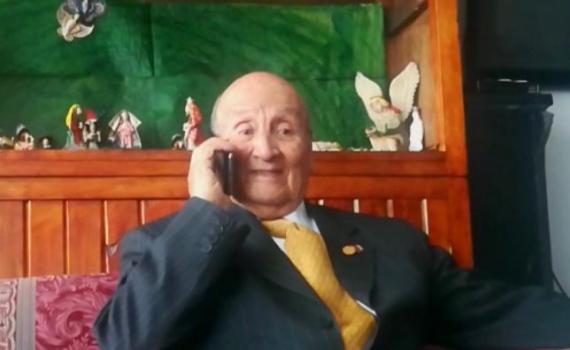
When their library went into lockdown the Main Public Library of Lima, which is part of the public libraries network run by the National Library of Peru (Biblioteca Nacional del Perú - BNP), was able to migrate some of their services online - for example, they organized virtual reading clubs and offered classes in subjects like mathematics, ICT, and e-literacy.
However, librarians were worried about the people who would be excluded from the library during lockdown because they did not have access to computers and the internet. They needed a non-face-to-face, non-virtual solution and came up with the idea of a telephone reading service, which they called ‘Aló BNP’.
“Although the telephone has been with us for decades, more and more we are communicating in writing via the internet,” said Ezio Neyra Magagna, head of the BNP.
‘Aló BNP’ was launched at the end of June and was instantly popular. Soon, over 200 people had registered for the service. By far, the majority were the elderly, who are the most isolated because they are at risk of severe illness when infected with COVID-19 and so must avoid in-person human contact wherever possible.
“Our ‘Aló BNP’ publicity reached the elderly indirectly,” said Ezio. “Our main channel was our social media. Even though older adults do not have the internet, do not use computer technology, or do not use social media, they have family members or caretakers who hear about the service, or know people who use the service. Elderly people or their family members also heard about the service through newspaper stories, TV and radio when the library gave interviews,” said Ezio.
HOW THE SERVICE WORKS
To register for the service, people must provide the library with information about themselves – their gender, their needs (education, entertainment, news) and interests, their preferences, such as poetry, books, magazines or newspapers, fiction or nonfiction, and they must suggest a good time for a call. The information is provided via an online form, and people who cannot access or use computers ask friends, family or caretakers for help.
Each new client is assigned a reader, and the first step is for the reader to contact the client to discuss and agree on a reading programme. Once a week, the reader telephones the client for a 30-minute reading session at the specified time. “When assigned to a client, the reader must accompany the client for two months. This allows the pair to build a relationship, even though they are physically distant,” said Ezio.
The service with just three readers who were librarians and eight clients. But the number of clients grew very quickly, and five more people signed up to be volunteer readers, each reading to six clients. Still registrations kept coming, and as the numbers of clients grew, so did the number of volunteer readers, and soon the library was regularly calling over 200 people.
“Of the 239 people who we have read to since June, the youngest is aged five, and the oldest is 95. Over 60% of calls have been to people aged over 50, and 10% to children needing help with their education; 61% of the clients are women and girls,” said Ezio.
BRINGING JOY THROUGH THE TELEPHONE
Elderly and isolated service users expressed joy at receiving the calls:
“This is a blessing for me since the pandemic is there, and I cannot go to the library.”
“Thank you for the time given. I am very grateful for the opportunity and the call. It is really nice to have someone to talk to about different themes.”
“I loved the book, and it makes me think. Many thanks to ‘Aló BNP’ for encouraging reading and love for it.”
“Thank you for telling me the legends; I remembered when I was young and traveling.”
“I really enjoy reading; it is interesting how history allows us to understand the present; I am very grateful for the service.”
Readers have been overwhelmed at the positive response:
“I am going to tell you about today’s call. The lady who received the call told me that she lived alone and that she felt lonely too - that it was very nice to receive a call from someone and, on top of that, for me to recite poems to her. She was very moved and thanked me because it improved her day. This makes me reflect on how the pandemic has physically alienated us. Still, through a phone call we can recover human warmth, even if it is just a little, that helps us continue our daily activities, both for the giver and the recipient.”
EXPANSION TO MEET THE GROWING DEMAND
To accommodate growing demand, the library has recruited over 100 new volunteer readers, and expects to reach about 2,000 people.
A new virtual telephone exchange will make it possible for people who do not have computers or the internet to register by phone. Readers will receive and make calls from home, and the new system also automatically allocates reading times, taking some of the administrative pressure off readers who were doing this manually.
- More innovative public library services that contribute to social inclusion.
- More public libraries responding to COVID-19.
PLIP-DIGITAL-INCLUSION Social Inclusion: Innovation Award





